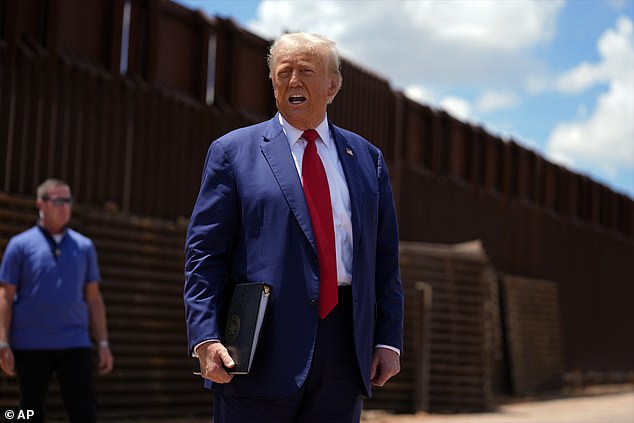President-elect Donald Trump threatened Monday to slap a 25 percent tariff on Mexican and Canadian goods as long as the countries allowed immigrants to flow over the U.S. border.
He also said he’d impose an additional 10 percent tariff on Chinese goods over the Chinese government’s refusal to make good on a promise to use the death penalty on drug dealers.
These actions, Trump said, would take place on the first day of his administration.
Trump outlined the drastic measures in two Truth Social posts Monday night, as he worked on the presidential transition from Mar-a-Lago.
He said the Mexican and Canadian tariffs would apply to ‘ALL products coming into the United States, and its ridiculous Open Borders.’
‘This Tariff will remain in effect until such time as Drugs, in particular Fentanyl, and all Illegal Aliens stop this Invasion of our Country!’
The president-elect also suggested that Mexico and Canada had ‘the absolute right and power to easily solve this long simmering problem’ – indicating he wanted the neighbors to do more to patrol their borders so migrants couldn’t sneak into the United States.
Trump also voiced frustation that the deadly drug fentanyl was still seeping into the U.S. from China.


Former President Donald Trump is photographed standing in front of the border wall in August during his reelection bid. The now president-elect has vowed to slap a 25 percent tariff on Mexico and Canada, suggesting they should be the ones to curb border crossings


Trump referenced a ‘caravan’ of migrants heading to the U.S. border through Mexico. This photograph was taken Wednesday in Tapachula, Mexico
‘I have had many talks with China about the massive amounts of drugs, in particular Fentanyl, being sent into the United States – But to no avail,’ Trump wrote.
‘Representatives of China told me that they would institute their maximum penalty, that of death, for any drug dealers caught doing this but, unfortunately, they never followed through, and drugs are pouring into our Country, mostly through Mexico, at levels never seen before,’ the incoming president complained.
‘Until such time as they stop, we will be charging China an additional 10% Tariff, above any additional Tariffs, on all of their many products coming into the United States of America,’ Trump said.
‘Thank you for your attention to this matter,’ he added.
Trump previously pledged to end China’s most-favored-nation trading status and add tariffs that would be in excess of 60 percent – a rate much higher than they were during his first term.
He was reelected earlier this month with many Americans attracted to his tough talk on illegal immigration and stopping the flow of fentanyl into the nation.
During his campaign, the Republican pledged to lead the largest deportation in American history.
On Truth Social Monday night, Trump spoke of droves of immigrants heading to the border ahead of his January 20th swearing-in.
‘Right now a Caravan coming from Mexico, composed of thousands of people, seems to be unstoppable in its quest to come through our currently Open Border,’ Trump said.
A caravan has been spotted weaving its way through Mexico en route to the United States.
President Joe Biden previously tried to dissuade migrants from illegally crossing into the U.S. by saying that they would no longer be eligible for asylum if they came in between ports of entry.
That policy change decreased illegal crossings by 40 percent over the summer.
Biden and Vice President Kamala Harris also chided Trump for derailing a bipartisan immigration bill that would have bolstered border security.
Trump now plans to hold America’s neighbors responsible for this problem.
The Republican was also elected in part thanks to the perception that he would be better at curbing inflation than Democratic nominee Harris.
Americans have grumbled about the high cost of living during Biden’s term in the aftermath of the COVID-19 pandemic.
Pollsters have found that many believe Trump will be able to bring down costs.
But a number of experts have warned that steep tariffs could end up actually punishing the American consumer – as costs would be passed on to them.

